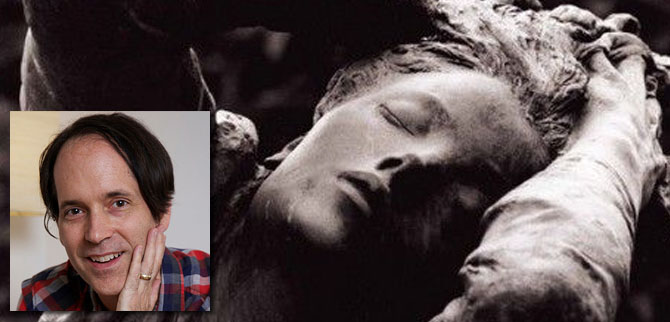Splitting Up, poems by Caley O’Dwyer
Caley O’Dwyer is a poet, visual artist, and teacher living in Los Angeles. He teaches creative writing and psychology at Antioch University and was previously an Associate Professor in University of Southern California’s Writing Program. His poems have appeared in Alaska Quarterly Review, Prairie Schooner, Cream City Review, Hayden’s Ferry Review, Warwick Review, Curator Magazine, Ekphrasis, Washington Square, and other venues, including the Tate Modern Museum in London. He is a winner of an Academy of American Poets Prize, a three-time nominee for the Pushcart Prize, and a recipient of a Helene Wurlitzer grant for poetry. His first book, Full Nova, was published by Orchises Press, and his in progress collections, Light, Earth and Blue and American Proverb feature, respectively, poems written in response to the abstract expressionist paintings of Mark Rothko and poems that find in contemporary American culture cause for wonder, terror and humor. Alongside his teaching and writing, Caley is a visual artist at the Brewery Arts Complex in downtown Los Angeles.
Splitting Up
Her finger came off in the seated
leg extender. As clean
as the curvilinear line by which
the up-swinging ankle bar
swished the air, her finger
dropped onto the floor.
I picked it up and handed it to her.
We got a couple tacos
and went to the hospital.
It was there she disclosed
the knowledge that she’d been
losing appendages
since birth and that loving her
would hurt. I had been hurt
each time before,
and the prospect of either of us
falling apart entirely
made me curious. Everything
went fine, until the evening
at the Poconos Restaurant.
We had lasagna and soup de jour
followed by pellets of pink ice cream
on a tremendous plate
when she began to talk about
the war. Which one, I said?
She said she didn’t want to talk about it.
This is when I snapped and said
please, what are you talking about?
And I wish I hadn’t because her head
fell off in the bread basket.
We had dessert in silence. She was
headless, upset. I helped her
get herself together,
paid and left the tip.
I grew nervous, detached.
Is this really what we want?
We went to therapy.
Like riding a shopping mall escalator,
there were expensive ups and downs.
I came to see these bouts of self-abnegation
as signs of trust. She wouldn’t fall
completely apart for just anyone.
When she split in half over our disagreement
about the number of keys
to duplicate for our house,
I wept, holding both of her in my arms.
We were enmeshed, but not for long.
When she realized I was just a jerk
making her nuts, she kept herself all one,
and split, leaving me to wonder what went wrong—
where had my good, other half finally gone?
Terminal A
Between failure and possibility
is the airport: interior railways,
shoppers roughly in sync
with the hidden metronome.
Someone with intelligent hair
knows the destination.
Simon says he will now smoke
in the enclosed patio.
Bridget buys a cell-phone,
Patty uses the bathroom,
Mildred chews gum.
Henry says he’ll be
“right back, cat’s got to
poo.” I begin to wonder
if we will ever fly at all.
Will we ever again
do anything at all?
“Just a few more minutes,
says Mildred,” as she buys
snow globes and bite-size Snickers.
“First thing I want to do
when we arrive is lay down,”
Patty says. “I want to lay down
the whole time,” I say.
A voice, disembodied,
preternatural, reminds us
“watch your belongings
at all times, shop at Starbucks,
and frequent the adjacent
convenience store.” On TV,
the terror alert changes
from blue to orange.
Someone on a freeway
has been abducted.
The football game
is four to six—two safety’s
and a missed extra point.
“Final call for flight twenty-one twelve.”
Mildred’s card is unreadable.
“Could you swipe it again?”
“I did.” “It’s not working.”
“I’d like to see that cat dead,”
Mildred says, as Henry returns,
smiling, terrifically relieved.
What folly to think we’ll finally
find ourselves moored
somewhere ahead, the green
fairways and sand pockets,
palm trees sculpted and plain,
endless, desultory. The heavens
go on and on, brightened by
our wishes, our maybes breeding
with the passion of bamboo.
In the early summer evening,
fireflies will rush the camellias
where children and their parents
wait to pet the furry animal
for a dollar. The streets are wide,
swimming pools in each backyard,
large pomegranates, the blueprint
for the city framed in gold
beside a statue of the Mayor.
Fragrant white blossoms
perched just so over a pond.
“Hey, look, it’s a new kind
of chocolate bar—Now More Air.”
“Let’s get out of here, Mildred,” I say.
“Hold on,” she says, “I see an opening.”
© Caley O’Dwyer


